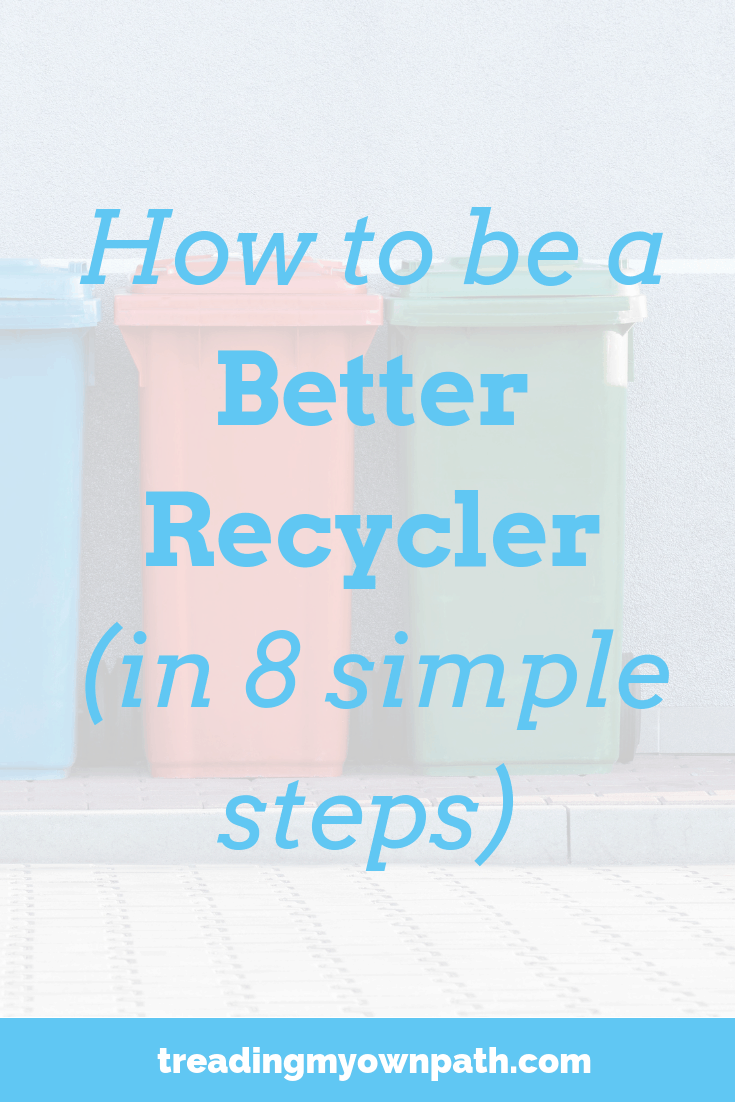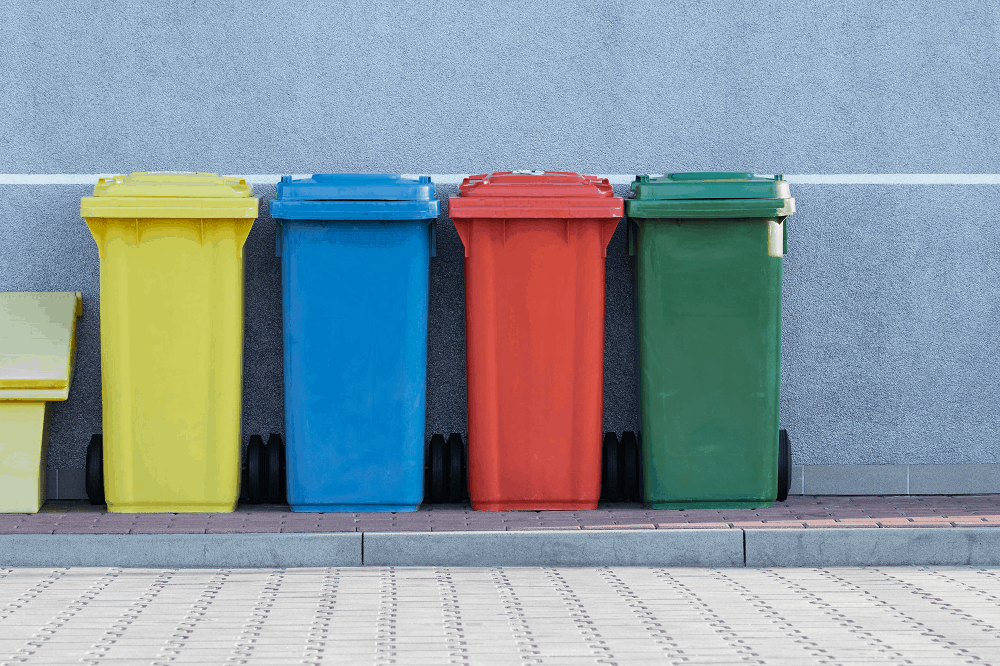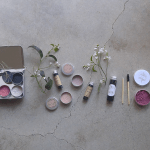How To Be A Better Recycler (in 8 Simple Steps)
I don’t love recycling. I’d much rather things didn’t need to be recycled in the first place, either because I’ve avoided them or because they are being reused exactly as they are. Much better to refill a jam jar than for it to be picked up from my kerbside, driven to a resource recovery centre, separated, crushed, melted down and manufactured back into a new jam jar.
Much as I don’t love recycling, it’s a necessity. We all recycle things.
When we start out on our waste reducing journey, recycling is the perfect place to start, because recycling is much better than landfill.
Down the track, we learn to reduce our recycling. But recycling doesn’t drop to zero.
So if we are inevitably going to recycle things, let’s be the best recyclers that we can be. Recycling correctly is better than recycling incorrectly.
Whether you’re a plastic-free or zero waste newbie, or whether you’ve been on the journey for a while, there’s probably the opportunity for you to be a better recycler. Here’s 8 tips to consider.

1. Get informed on what can be recycled where you live
There’s a big difference between ‘theoretically recyclable’ and ‘actually recycled’. Lots of things can be recycled in theory, but they aren’t – because it’s too expensive to process, there’s not enough volume for it to be viable, or there’s not enough demand for the recycled product.
Companies want us to think that their products are recyclable and so they splash recycling logos all over the packaging. But if it’s not a material that is recyclable in your area, it won’t be recycled, however much both you and the company who produced the packaging want it to be.
You need to find out what’s recyclable in your area. What’s recyclable overseas or even in the next town isn’t necessarily what’s recyclable for you.
If you have kerbside recycling, it is your local council that provides the service (either themselves, or contracted out). Contact them to find out what can and cannot be recycled. They’ll probably have information on their website, but you can also call and ask to speak to the waste officer.
2. Follow the Rules!
Recycling is different everywhere, and the rules that your council or recycling provider tell you to follow are the ones that you need to follow. If you see something that seems like a much better idea on the internet but goes against what your local council says to do, don’t be tempted!
3. Clean your recyclables
Whether your council tells you to or not, it’s always better to rinse out your dirty recyclables. (Use the water at the end of your washing-up, and give them a quick rinse.) There’s a chance that someone somewhere might have to handle them, or breathe in the air where they’re processed and stored.
It might not be necessary for the machinery, but it is better for the people who work in the industry. Dried-on fermented cat food or sour milk never increased the value of recyclables, ever.
4. Check for updates regularly
What’s recyclable now isn’t necessarily the same as what was recyclable 6 months ago, and it might change again 6 months into the future. That’s because recyclables are commodities, and their value increases and falls with supply and demand. Many materials recovery facilities sell recyclables using short-term contracts, maybe as little as 3 months.
Fluctuating markets affect price, and if something isn’t valuable enough to recycle, it won’t be recycled.
Don’t assume that just because you checked the council recycling guidelines once in 1997 that the information you remember from then is still relevant today. It probably won’t be! It is much better practice to check in with your local council every three months or so, to find out what’s changed.
5. Look for alternative solutions (beyond kerbside recycling)
Recycling isn’t limited to kerbside collection systems. Plenty of things can be recycled at drop-off points provided by your council or at collection bins at businesses and more responsible retailers. Textiles, light bulbs, paint, scrap metal, printer cartridges, eWaste (old electronics) and oil can all be recycled.
As well as your council website, these national recycling databases have information for where to take recycables:
recyclingnearyou.com.au (Australia)
earth911.com (USA)
recycleforscotland.com (Scotland)
recycleforwales.org.uk (Wales)
recyclenow.com (England)
6. Don’t wishcycle
Wishcycling is when we put something in the recycling bin and hope it will be recycled, even though we know the recycling bin isn’t the proper place for it. Don’t do it! (Yes, we all want everything to be recyclable and we all feel guilty about landfill. But wishcycling isn’t the answer!)
Recycling properly can take a little more work, to find out where to go and then drop the item off. In the scheme of things, it isn’t a very big ask.
I was once told by the guide of a tour of a materials recovery facility, that the craziest thing he ever saw in a yellow-lidded kerbside recycling bin was a car door. Of course, being made of metal, a car door is completely recyclable. But it isn’t meant to go in the kerbside recycling bin! The materials recovery facility is not set up to deal with that kind of material, and incorrect materials damage machinery. The car door could have been taken to a scrap metal recycler instead.
Take the time to find out the best place for the item you want to recycle. And if you really can’t find a place to take the item to be recycled where you live, accept that it has to go in the landfill bin.
(Your next step is to figure out how to avoid that item again in the future.)
7. Less Recycling is Better
When I say ‘be a better recycler’ I do not mean ‘recycle more’. Less recycling is better. That’s less trucks on the roads, less machinery sorting materials, less energy spent processing our recyclables, less resources consumed.
An empty recycling bin is better than a full recycling bin.
Yes, at the start of our journey we all start out with a full-to-overflowing recycling bin. Plus if you’re anything like I was, you’re mightily proud of said overflowing recycling bin.
It’s a journey, and one that starts with maximum recycling works towards minimum recycling.
First we learn exactly what goes into our recycling bin, then we learn where to recycle all the other things, and then we start to think about how to reduce our recycling.
Recycling is where we start. It is not where we stop!
8. Refuse, reduce, reuse (before recycling)
Recycling is only one up from landfill; it’s a not-quite-last-but-not-far-off resort. If we’re going to create less recycling, we need to be thinking further up the waste stream. We need to be thinking about refusing, reducing and reusing.
Refusing happens when we avoid the packaging and materials that will need to be recycled in the first place. Choosing loose produce over the prepackaged stuff, not taking a plastic bag, asking for no plastic straw.
Reducing happens when we know we need some kind of packaging, but we try to limit what we take. Opting for the bigger packet rather than the multi-pack of individually wrapped packets, or choosing a single bottle of juice over several juice boxes.
Reusing happens when we either take our own reusables to the shops: produce bags for fruit and veg, containers for trips to the deli and other counters, a coffee cup to the local cafe.
By looking at the packaging in our recycling bin we can see exactly where we might do better, and start looking for solutions, one item at a time.
Now I’d love to hear from you! How does recycling work where you live? Do you have kerbside recycling? Where else can you take your recycables? How have you managed to reduce your non-recycables? Anything else to add? Please share your thoughts and experiences in the comments below!
[leadpages_leadbox leadbox_id=1429a0746639c5] [/leadpages_leadbox]







Hi Lindsay. Proud to say my rubbish bin only goes out once every three or four weeks. (Its only me and three dogs). I now rip up all cardboard and paper and put in compost bin something I wasnt doing previously. Thanks for all your tips.
Hurrah, that’s great Carey! Keep up the good work!
We struggle with this a lot here in Calgary. We’ve noticed that nearly everything made out of plastic has some form of image on it that indicates that it can be recycled. However in practice a large amount will never actually get recycled. I personally wish that we could get a country wide (or ideally, international) standard for recycling and so it is clear exactly what the symbols mean.
Another thing we are trying to do is ‘re-urpose’ plastic. For example we have a few plastic bottle bird feeders which I’ve actually taken home from a recycling bin at my office! Thanks
Yes, that is half the problem – companies splash these logos and write “recyclable” all over their packaging and people mistakenly think they will definitely be able to recycle it where they live. Some packaging is all kinds of mixed materials and the brand will still write “please recycle” on it!
Talking of repurposing plastic, my neighbour just made about 70 plastic PET bottles into fruit fly traps for our community orchard. It often has good uses in the garden!
What a great article. Recycling is sold to us as a way of justifying continued consumption but you’re so right when you say it is better to have an empty recycling bin than a full one. Refusing, reducing and re-using is so much better.
Yes, glad we agree on all these things Nicola! ;)
As our recycle bins are picked up fortnightly I find the bin only has a small amount in it. Therefore I only put it out for collection when needed. Usually 6 to 8 weeks apart. I figure that if more people did this then pollution from the rubbish truck ‘stopping & starting’ would be reduced. Same with the rubbish bin as long as it doesn’t get too stinky.
That is very true Phil (oh and good for you on having such a small recycling bin, hurrah!). Our council pays the contractor “per lift” which means it costs the council more to have a half empty bin picked up 4 times over a full bin picked up twice. So as well as reducing fuel, trucks etc it is a saving for the council and they can spend that money on something more useful :)
Brilliant distilling of the issue Lindsay, thank you! PS, your plastic free crackers were a hit at my recent Earth Carers graduation!
Ah thank you! Those crackers seems to have been made plenty of times – people keep telling me that they tried it and it is great! Hurrah for no more plastic cracker packets!
Hi most of the rubbish in my bins, are someone elses’, I walk regularly for exercise and pick up rubbish as I go and bring most of it home and put in the bin. At least I put it into the correct bins.
Haha, I often think the same when I do litter pick-ups Melinda!
Love yoir tips, particularly about wish cycling. Have shared on my FB page in the .hopes that more follow suit.
I think we have all been guilty of it at some stage – I know I have! But now I take the time to learn the rules and then follow them. Better than contaminating the recycling bin!
this is a great summary of recycling do and don’t! almost everyone i know believes that anything with a recyclable logo on it can be popped into a recycling bin, and magically recycled. we have mixed-stream recycling where i live, and people throw nearly everything in, hoping for the best. (wish cycling at its finest!) when i tell people they should rinse out tins and jars, they laugh, or look at me like i’ve three heads. hopefully seeing it in print when i share this post may help… then there are all the people i know who recycle nothing. nothing! like my neighbour, who, although we pay for both rubbish and recycling through our dues, cannot be bothered to recycle at all. he’s told me as much. every week, he puts out two enormous wheeled bins of trash. and every week, no yellow-topped bin at all from his household of four people and two dogs. they eat mostly takeaway food for dinners, too, so it really is a lot of waste… sigh. my hope is that his sort are dwindling, and your sort increasing. thanks for all your informative posts.
I hear you with all of these points! There are definitely people who think that just by owning a recycling bin they are a recycling expert! The truth is recycling changes often, and keeping up to date with everything is a challenge – even people in the waste industry don’t get it right all the time. My hope is that people who truly don’t care are on the decline Honestly, I think they are. Awareness is growing all the time :)
We don’t have recycling available (or even a rubbish collection) so I use to 7 and 8 a lot!
Wow, that would definitely make you think a little harder about choosing “good” packaging and all the things to avoid it in the first place, Liz!
You make a great point about recycling with your bin. I need to get a recycler for my soda cans. I need to get all of them to a recycling center as fast as possible.
I found it extremely interesting that scrap metal can be recycled easily. My father has a lot of scrap aluminum in his garage that he has been meaning to get rid of. I will make sure that he takes it to a reliable scrap metal recycling service.
Diaper Recycling Technology® recycling machines solve the separation of bio waste such as human excretion that come together with soiled diapers and recovers the plastics, pulp, SAP and compost.
Hi Jemmi, I can see that you work for this company. Sounds interesting, who are the buyers/what are the markets for the end products?
Thank you for explaining that you should clean your recyclables. I’ve been wondering what kind of steps I should be taking when I recycle. I wonder if this holds true for when you recycle metals.
I think this one is Really fine content which is of really very high quality and people always look for the best and alternative to process the Food Waste Composting Machine but machines do their work to process this waste.